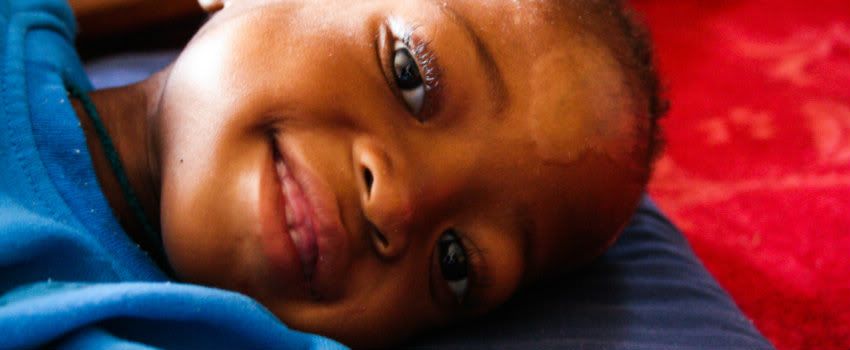I tapped the brakes quickly and slowed the truck as it curved along the black line of pavement, snaking through the mountainside villages and overlooking the lowlands below.
A group of five adolescent boys crossed the roadway a few dozen yards ahead, almost in slow motion, their stark white eyes staring back at me from their painted faces -- a charcoal, midnight black, covering their arms and chests as well. They wore some sort of brown animal hide or dirty sheepskin skirts, and each carried over one shoulder an enormous, charred-black log.
"What was that?" I asked Nthabeleng as we zoomed past on our way to Maseru, and they appeared smaller and smaller in my rearview mirror.
"They are going for circumcision," she said.
"Whoah," I said.
I'd heard about the "initiation schools" that young teenage boys go through here, where they are taken to the middle of nowhere, circumcised and "turned into men." But seeing the ritualized preparations of the process, the boys in what seemed a trance-like state, was another thing entirely.
"Why are they painted black?" I asked.
"I don't know," Nthabeleng said.
A few hours later, we sat in the new mall that was built in Maseru at the end of last year. There are escalators and shining storefronts and nice bathrooms and even a movie theater. It's like nothing else in the entire country.
In other words, I was drinking a cappuccino.
I thought about the vast difference between this world and the world of the initiation schools.
Then, up the escalator in front of us, came a handful of students in uniforms. Then another handful. Then a whole chattering school of them, wide-eyed and nervous.
"Are they on a field trip here?" I asked.
"Yeah," Nthabeleng said. "They want to teach them, "What is a mall?," "What is a lift?"
In all, we saw about half-a-dozen school groups at the mall. I thought of young American kids barking at their mothers for Cinnabunns and ridiculously priced clothing at malls in the U.S., and smiled at the eager excitement of these Basotho kids -- buying nothing, but enjoying it nonetheless.
The next day, Nthabeleng and I were again driving through the countryside, this time on our way back to Mokhotlong, when I noticed a gathering of people in a field to the side of the road. At the center of the gathering were a handful of young teenage girls -- dressed only in grass skirts, painted white from the waist up, and dancing.
"What was that?" I asked Nthabeleng again.
"Female circumcision," she said.
"They do that here?" I said, surprised.
"Yes," she said.
I sat with a far more intense feeling of pity for the girls than I'd had for the boys, thinking back to the mall and wondering what sort of connection my mind was trying to make between the two rituals and the new mall.
Then it came to me, painted black and white.
Nowhere else have I seen such stark examples of modernity and ritual, in such close proximity.
They were each, unto themselves, indicators of the upheaval I see occurring in Lesotho.
Many people in this country still live like they did thousands of years ago. Others live entirely modern lives. And in the transition of the population from the former to the latter, there is generational chaos.
Quite often since I've been here, TTL outreach has found a baby in terrible condition, cared for by a grandmother without the means or knowledge to provide proper nutrition, and left behind by a mother who "disappeared" one day in search of a better life in Maseru.
I wonder how long the people here will continue living in remote villages, or even in towns like Mokhotlong, before the desire to meet the modern world overpowers their devotion to family, to history, to the past. I wonder if they would be better off if they abandoned their simple lives in the mountains. I wonder how much of their suffering is directly linked to HIV, and if they would be otherwise content to live another thousand years in the mountains, if only they had their health.
I can't quite grasp the complexity of this moment-in-time for Lesotho. All I know is that babies are getting caught in the crossfire, and too many middle-aged people are dead from AIDS to stem the tide of consequences.


1 comment:
Very Powerful
Post a Comment